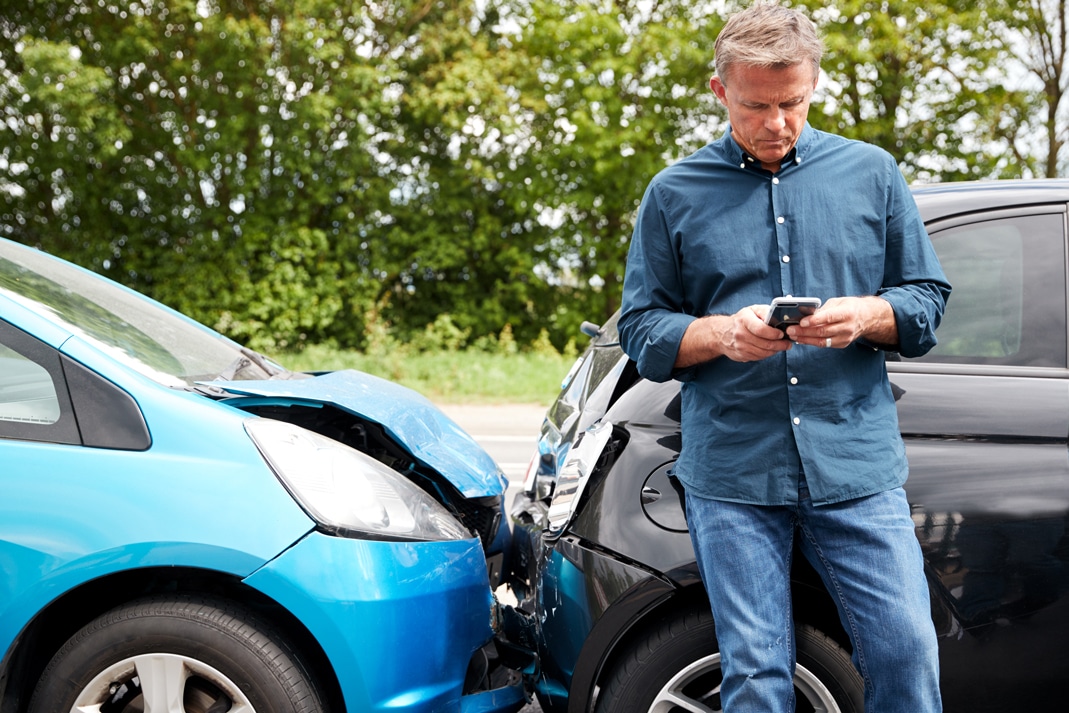In driving, as with baseball, the main goal is to get home safe. The difference between driving and sports, however, is that displays of aggression on the road can get you hurt—or even killed.
Almost all of us have seen aggressive driving by other drivers, or even road rage, at one point or another. If you’ve been a victim of aggressive driving behaviors yourself, you know how terrifying it can be. And you also may want to know what legal options might be available to you after a road rage incident.
In this blog post, we’ll take a closer look at how aggressive driving is defined, when you might have a legal case if you’re in a car accident with an aggressive driver, and how you can protect yourself (and your case) to ensure you get the compensation you deserve.
Examples and Effects of Aggressive Driving
Most people associated aggressive driving with actions like tailgating, blocking lane changes, cutting off cars, making rude gestures, etc. However, simple rudeness is not necessarily aggressive driving in a legal sense.
The National Highway Traffic Safety Administration (NHTSA) defines aggressive driving as any moving traffic offenses that endanger other persons or property. One primary example is speeding, but aggressive driving can include violations such as the following:
- Improper turning
- Lane changing or illegal passing
- Failure to yield the right of way
- Failure to signal
- Ignoring warning signs
- Disregarding traffic signs and signals
- Driving on the shoulder or side of the road
- Following too closely
- Driving erratically
Data collected by the NHTSA between 2003 and 2007 shows that, according to its definition, aggressive driving played a role in 56 percent of fatal accidents on U.S. roads. In 2014 alone, speeding was a factor in 9,262 traffic deaths on U.S. roads, according to the NHTSA.
Do You Have a Case Against the Other Driver?
Most car accident cases, including those involving aggressive driving or road range, are based on negligence. In simple terms, to have a case, you need to prove that:
- The other driver owed you a “duty of care”—in other words, they have a responsibility to protect your welfare. Obviously, drivers on the road owe this duty to each other.
- The other driver violated that duty of care. Certainly, road rage incidents would qualify as a violation.
- You suffered damages (property damage, medical bills, lost wages, pain and suffering, etc.) due to the other driver’s negligent actions.
If a driver was behaving aggressively or acting rudely to you, but there was no car accident and you did not suffer any injuries or damages, you do not have grounds to sue.
However, if you were hurt or harmed because of the incident, then there is a good chance you are entitled to compensation. However, to improve your chances of receiving a great settlement or jury award, you’ll need to make sure you keep a cool head yourself.
RELATED: “Do I Have a Personal Injury Case?” How Our Lawyers Evaluate Claims
Reckless Driving and Punitive Damages
In a car accident case, broadly speaking, there are three potential categories of damages that an injured person can be awarded:
- Economic damages
- Non-economic damages
- Punitive damages
Economic damages refer to expenses that have a defined “price tag,” like medical bills, lost wages, property damage, cost of necessary household services, skilled nursing care, etc. Non-economic damages refer to pain and suffering, emotional distress, or other costs to your quality of life that don’t have a clear price tag, but still deserve compensation. Together, these are known as compensatory damages. In other words, they’re supposed to compensate you for what you’ve lost and make the situation right.
Punitive damages are different. They’re meant to punish at-fault parties whose actions exceed simple negligence, but instead prove complete disregard for the safety of others—if not outright malice. In general, punitive damages are rare. But they’re more common in cases where the at-fault driver demonstrates especially aggressive or reckless behavior—for example, in a case of road rage.
Punitive damages can also significantly increase the amount of money that an injured person can recover. Although they are capped in Texas, punitive damages can be awarded up to either $200,000, or a value equal to double your economic damages plus your non-economic damages—whichever is higher. If you’ve been the victim of a road rage incident, hiring an experienced personal injury attorney who can successfully prove the other driver’s recklessness and win punitive damages can help you truly maximize your compensation.
RELATED: Can I Get Punitive Damages After a Car Accident in Texas?
The Difference Between Criminal and Civil Cases
Drivers who threaten or harm others in a road rage incident in Texas may wind up facing criminal charges, such as reckless driving (a misdemeanor in Texas), or even assault and battery in cases where a road rage driver intentionally tried to harm others. However, it’s important to understand that criminal charges are completely separate from a personal injury case.
Criminal cases can result in punishments like jail time, fines, and suspended licenses. However, if you have suffered damages related to the car accident (medical costs, lost wages, etc.), you may need to file a personal injury lawsuit against the at-fault driver.
Because criminal and civil cases are completely separate and have different standards for the burden of proof, a reckless driver does not necessarily have to be charged with or convicted of a crime for them be to held liable for your damages. Regardless of whether the state presses charges, you should absolutely file a claim if you are hurt in an accident.
What to Do If You’ve Been in a Car Crash Involving an Aggressive Driver
Emotions can run high after any auto accident, regardless of the circumstances. However, accidents caused by road rage can be especially emotionally stressful. Unfortunately, getting into a shouting match (or worse) with an aggressive driver after an accident can put your safety in jeopardy, and could complicate the evidence-gathering process.
If you find yourself in an encounter with an aggressive driver, remember to stay as calm as you can.
- Don’t apologize for anything, but don’t argue or make accusations, either.
- Stick to the facts, and go through the normal post-crash processes, including making sure no one was hurt, calling the police, and collecting as much information as you can (photos of the accident scene and eyewitness contact information).
- Make sure you see a doctor as soon as possible if you have any symptoms (however minor), and call a personal injury attorney.
One exception: If the other driver is still acting angry or aggressively, and you feel that you may be in danger of an altercation, don’t get out of the car. Wait for the police to arrive on the scene.
An Experienced Car Accident Attorney Can Help You Protect Your Legal Rights
Aggressive drivers, as you might expect, aren’t always cooperative with a car crash investigation. They may even lie about what happened and try to pass the blame, turning the case into a “your word versus mine” situation. This can be extremely frustrating, and even scary, for injured people who just want fair compensation for an accident that wasn’t their fault.
That’s why you need a tough, experienced lawyer who is used to handling these types of cases and knows how to get evidence even in challenging circumstances.
For example, this might include things like working with accident reconstruction experts, who can analyze things like skid marks, vehicle damage, final resting place of the vehicles, or debris patterns to piece together how an accident really occurred.
It might also include speaking with eyewitnesses, identifying if there is any video recording (and if there is, making sure the footage is preserved), looking at GPS data, 911 calls, and more—whatever information is available that can help your case. The team at Crosley Law consistently uses aggressive tactics such as these to uncover the truth in accidents involving negligent, aggressive, and reckless drivers.
The sooner you call us after your accident, the better our odds of collecting the necessary evidence and protecting you from underhanded tactics used by the insurance adjuster to minimize your claim.
RELATED: Sophisticated Tactics Uncover a Trucker’s Negligence: J.T.’s Story
Crosley Law: Holding Reckless Drivers Accountable and Getting You the Compensation You Deserve
Even if you drive as safely as possible, there is no way to account for the reckless behavior of other drivers on the road. Every day, people suffer injuries or lose their lives because of other drivers’ careless decision-making behind the wheel, and those people deserve justice and compensation for their losses.
When aggressive drivers are allowed to get away with reckless behavior, and insurance companies can get away with paying those injured in an accident far less than their case is worth, it makes the roadways less safe for everyone.
If you’ve been hurt in an accident that wasn’t your fault, schedule a free consultation with Crosley Law. We will listen to the details of your story and provide you with candid advice about what your best course of action is moving forward. If we think you have a case, we’ll get to work immediately — and you don’t have to pay us unless we achieve a settlement or win your case in court. We fight hard to hold the at-fault parties accountable and earn the largest possible settlements or trial verdicts for our clients.
Call our offices at 210-LAW-3000 | 210-529-3000 or fill out our convenient online contact form today.
The content provided here is for informational purposes only and should not be construed as legal advice on any subject.









